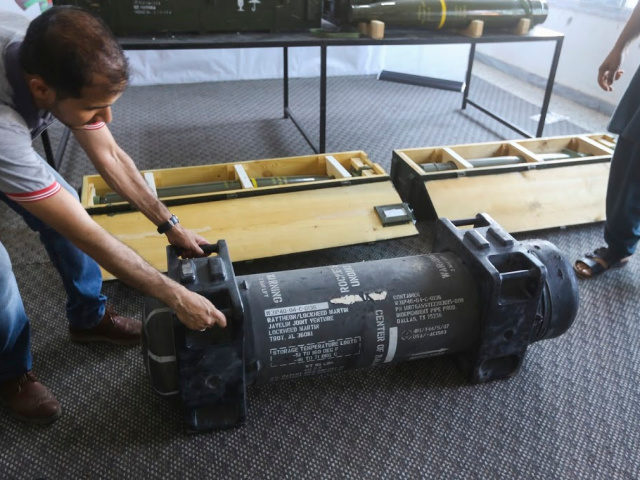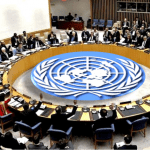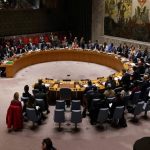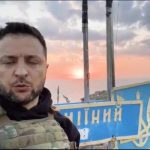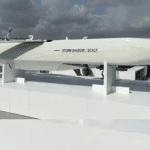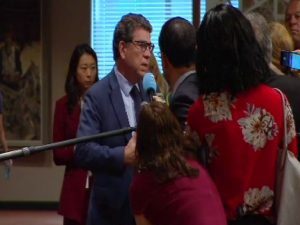 France has denied breaching a UN arms embargo after four of its anti-tank missiles were found on a base loyal to a rogue Libyan general.
France has denied breaching a UN arms embargo after four of its anti-tank missiles were found on a base loyal to a rogue Libyan general.
The country’s defence ministry says the “unusable” US-made Javelin missiles were never intended to be passed to any group, and were due to be destroyed.
The likelihood of the crisis in Libya abating anytime soon seems unlikely.
The country has been in turmoil since Muhammad Ghadaffi was toppled and killed. This has led different militia factions laying claim to different parts of the country.
On July the second, an air strike hit a detention centre for mainly African migrants in a suburb of the Libyan capital Tripoli killing at least 44 people and wounding more than 130.
It was the highest publicly reported toll from an air strike since eastern forces under Khalifa Haftar launched a ground and aerial offensive three months ago to take Tripoli, the base of Libya’s internationally recognised government.
United Nations Libya envoy Ghassan Salame condemned the strike, saying it “clearly amounts to the level of a war crime”.
“There were refugees and migrants and we all condemn that. We haven’t agreed on an element for the press. Maybe we’ll have a press statement, but we are still discussing it. I think also we all agree on the issue that Ghassan Salame efforts need to be supported, but I don’t, I don’t want to tell all the areas where agree or are not in agreement.”
United Nations Secretary-General Antonio Guterres was outraged by the air strike and called for an independent investigation, his spokesman said.
The U.N. Security Council met on Libya behind closed doors later on Wednesday, diplomats said.
U.N. human rights chief Michelle Bachelet said it was the second strike on the centre during the recent fighting, even though its coordinates had been communicated to the warring sides.
Libya is one of the main departure points for African migrants, fleeing poverty and war, to try to reach Italy by boat, but many are picked up and brought back by the Libyan coast guard, supported by the European Union.
Some 6,000 are held in government-run detention centres in what human rights groups and the United Nations say are often inhuman conditions.
But the recent discovery of several Javelin missiles found in a rebel base in Libya believed to be purchased by the French government from the United States has given another dimension to crisis rocking Libya.
With the country’s defense ministry insisting the US-made Javelin missiles were never intended to be passed to any group, and were due to be destroyed, casting a shadow on how deep the involvement of France is in the ongoing battle for authority in Libya.
 France has denied breaching a UN arms embargo after four of its anti-tank missiles were found on a base loyal to a rogue Libyan general.
France has denied breaching a UN arms embargo after four of its anti-tank missiles were found on a base loyal to a rogue Libyan general.
The country’s defence ministry says the “unusable” US-made Javelin missiles were never intended to be passed to any group, and were due to be destroyed.
The likelihood of the crisis in Libya abating anytime soon seems unlikely.
The country has been in turmoil since Muhammad Ghadaffi was toppled and killed. This has led different militia factions laying claim to different parts of the country.
On July the second, an air strike hit a detention centre for mainly African migrants in a suburb of the Libyan capital Tripoli killing at least 44 people and wounding more than 130.
It was the highest publicly reported toll from an air strike since eastern forces under Khalifa Haftar launched a ground and aerial offensive three months ago to take Tripoli, the base of Libya’s internationally recognised government.
United Nations Libya envoy Ghassan Salame condemned the strike, saying it “clearly amounts to the level of a war crime”.
“There were refugees and migrants and we all condemn that. We haven’t agreed on an element for the press. Maybe we’ll have a press statement, but we are still discussing it. I think also we all agree on the issue that Ghassan Salame efforts need to be supported, but I don’t, I don’t want to tell all the areas where agree or are not in agreement.”
United Nations Secretary-General Antonio Guterres was outraged by the air strike and called for an independent investigation, his spokesman said.
The U.N. Security Council met on Libya behind closed doors later on Wednesday, diplomats said.
U.N. human rights chief Michelle Bachelet said it was the second strike on the centre during the recent fighting, even though its coordinates had been communicated to the warring sides.
Libya is one of the main departure points for African migrants, fleeing poverty and war, to try to reach Italy by boat, but many are picked up and brought back by the Libyan coast guard, supported by the European Union.
Some 6,000 are held in government-run detention centres in what human rights groups and the United Nations say are often inhuman conditions.
But the recent discovery of several Javelin missiles found in a rebel base in Libya believed to be purchased by the French government from the United States has given another dimension to crisis rocking Libya.
With the country’s defense ministry insisting the US-made Javelin missiles were never intended to be passed to any group, and were due to be destroyed, casting a shadow on how deep the involvement of France is in the ongoing battle for authority in Libya.
 France has denied breaching a UN arms embargo after four of its anti-tank missiles were found on a base loyal to a rogue Libyan general.
France has denied breaching a UN arms embargo after four of its anti-tank missiles were found on a base loyal to a rogue Libyan general.
The country’s defence ministry says the “unusable” US-made Javelin missiles were never intended to be passed to any group, and were due to be destroyed.
The likelihood of the crisis in Libya abating anytime soon seems unlikely.
The country has been in turmoil since Muhammad Ghadaffi was toppled and killed. This has led different militia factions laying claim to different parts of the country.
On July the second, an air strike hit a detention centre for mainly African migrants in a suburb of the Libyan capital Tripoli killing at least 44 people and wounding more than 130.
It was the highest publicly reported toll from an air strike since eastern forces under Khalifa Haftar launched a ground and aerial offensive three months ago to take Tripoli, the base of Libya’s internationally recognised government.
United Nations Libya envoy Ghassan Salame condemned the strike, saying it “clearly amounts to the level of a war crime”.
“There were refugees and migrants and we all condemn that. We haven’t agreed on an element for the press. Maybe we’ll have a press statement, but we are still discussing it. I think also we all agree on the issue that Ghassan Salame efforts need to be supported, but I don’t, I don’t want to tell all the areas where agree or are not in agreement.”
United Nations Secretary-General Antonio Guterres was outraged by the air strike and called for an independent investigation, his spokesman said.
The U.N. Security Council met on Libya behind closed doors later on Wednesday, diplomats said.
U.N. human rights chief Michelle Bachelet said it was the second strike on the centre during the recent fighting, even though its coordinates had been communicated to the warring sides.
Libya is one of the main departure points for African migrants, fleeing poverty and war, to try to reach Italy by boat, but many are picked up and brought back by the Libyan coast guard, supported by the European Union.
Some 6,000 are held in government-run detention centres in what human rights groups and the United Nations say are often inhuman conditions.
But the recent discovery of several Javelin missiles found in a rebel base in Libya believed to be purchased by the French government from the United States has given another dimension to crisis rocking Libya.
With the country’s defense ministry insisting the US-made Javelin missiles were never intended to be passed to any group, and were due to be destroyed, casting a shadow on how deep the involvement of France is in the ongoing battle for authority in Libya.
 France has denied breaching a UN arms embargo after four of its anti-tank missiles were found on a base loyal to a rogue Libyan general.
France has denied breaching a UN arms embargo after four of its anti-tank missiles were found on a base loyal to a rogue Libyan general.
The country’s defence ministry says the “unusable” US-made Javelin missiles were never intended to be passed to any group, and were due to be destroyed.
The likelihood of the crisis in Libya abating anytime soon seems unlikely.
The country has been in turmoil since Muhammad Ghadaffi was toppled and killed. This has led different militia factions laying claim to different parts of the country.
On July the second, an air strike hit a detention centre for mainly African migrants in a suburb of the Libyan capital Tripoli killing at least 44 people and wounding more than 130.
It was the highest publicly reported toll from an air strike since eastern forces under Khalifa Haftar launched a ground and aerial offensive three months ago to take Tripoli, the base of Libya’s internationally recognised government.
United Nations Libya envoy Ghassan Salame condemned the strike, saying it “clearly amounts to the level of a war crime”.
“There were refugees and migrants and we all condemn that. We haven’t agreed on an element for the press. Maybe we’ll have a press statement, but we are still discussing it. I think also we all agree on the issue that Ghassan Salame efforts need to be supported, but I don’t, I don’t want to tell all the areas where agree or are not in agreement.”
United Nations Secretary-General Antonio Guterres was outraged by the air strike and called for an independent investigation, his spokesman said.
The U.N. Security Council met on Libya behind closed doors later on Wednesday, diplomats said.
U.N. human rights chief Michelle Bachelet said it was the second strike on the centre during the recent fighting, even though its coordinates had been communicated to the warring sides.
Libya is one of the main departure points for African migrants, fleeing poverty and war, to try to reach Italy by boat, but many are picked up and brought back by the Libyan coast guard, supported by the European Union.
Some 6,000 are held in government-run detention centres in what human rights groups and the United Nations say are often inhuman conditions.
But the recent discovery of several Javelin missiles found in a rebel base in Libya believed to be purchased by the French government from the United States has given another dimension to crisis rocking Libya.
With the country’s defense ministry insisting the US-made Javelin missiles were never intended to be passed to any group, and were due to be destroyed, casting a shadow on how deep the involvement of France is in the ongoing battle for authority in Libya.
 France has denied breaching a UN arms embargo after four of its anti-tank missiles were found on a base loyal to a rogue Libyan general.
France has denied breaching a UN arms embargo after four of its anti-tank missiles were found on a base loyal to a rogue Libyan general.
The country’s defence ministry says the “unusable” US-made Javelin missiles were never intended to be passed to any group, and were due to be destroyed.
The likelihood of the crisis in Libya abating anytime soon seems unlikely.
The country has been in turmoil since Muhammad Ghadaffi was toppled and killed. This has led different militia factions laying claim to different parts of the country.
On July the second, an air strike hit a detention centre for mainly African migrants in a suburb of the Libyan capital Tripoli killing at least 44 people and wounding more than 130.
It was the highest publicly reported toll from an air strike since eastern forces under Khalifa Haftar launched a ground and aerial offensive three months ago to take Tripoli, the base of Libya’s internationally recognised government.
United Nations Libya envoy Ghassan Salame condemned the strike, saying it “clearly amounts to the level of a war crime”.
“There were refugees and migrants and we all condemn that. We haven’t agreed on an element for the press. Maybe we’ll have a press statement, but we are still discussing it. I think also we all agree on the issue that Ghassan Salame efforts need to be supported, but I don’t, I don’t want to tell all the areas where agree or are not in agreement.”
United Nations Secretary-General Antonio Guterres was outraged by the air strike and called for an independent investigation, his spokesman said.
The U.N. Security Council met on Libya behind closed doors later on Wednesday, diplomats said.
U.N. human rights chief Michelle Bachelet said it was the second strike on the centre during the recent fighting, even though its coordinates had been communicated to the warring sides.
Libya is one of the main departure points for African migrants, fleeing poverty and war, to try to reach Italy by boat, but many are picked up and brought back by the Libyan coast guard, supported by the European Union.
Some 6,000 are held in government-run detention centres in what human rights groups and the United Nations say are often inhuman conditions.
But the recent discovery of several Javelin missiles found in a rebel base in Libya believed to be purchased by the French government from the United States has given another dimension to crisis rocking Libya.
With the country’s defense ministry insisting the US-made Javelin missiles were never intended to be passed to any group, and were due to be destroyed, casting a shadow on how deep the involvement of France is in the ongoing battle for authority in Libya.
 France has denied breaching a UN arms embargo after four of its anti-tank missiles were found on a base loyal to a rogue Libyan general.
France has denied breaching a UN arms embargo after four of its anti-tank missiles were found on a base loyal to a rogue Libyan general.
The country’s defence ministry says the “unusable” US-made Javelin missiles were never intended to be passed to any group, and were due to be destroyed.
The likelihood of the crisis in Libya abating anytime soon seems unlikely.
The country has been in turmoil since Muhammad Ghadaffi was toppled and killed. This has led different militia factions laying claim to different parts of the country.
On July the second, an air strike hit a detention centre for mainly African migrants in a suburb of the Libyan capital Tripoli killing at least 44 people and wounding more than 130.
It was the highest publicly reported toll from an air strike since eastern forces under Khalifa Haftar launched a ground and aerial offensive three months ago to take Tripoli, the base of Libya’s internationally recognised government.
United Nations Libya envoy Ghassan Salame condemned the strike, saying it “clearly amounts to the level of a war crime”.
“There were refugees and migrants and we all condemn that. We haven’t agreed on an element for the press. Maybe we’ll have a press statement, but we are still discussing it. I think also we all agree on the issue that Ghassan Salame efforts need to be supported, but I don’t, I don’t want to tell all the areas where agree or are not in agreement.”
United Nations Secretary-General Antonio Guterres was outraged by the air strike and called for an independent investigation, his spokesman said.
The U.N. Security Council met on Libya behind closed doors later on Wednesday, diplomats said.
U.N. human rights chief Michelle Bachelet said it was the second strike on the centre during the recent fighting, even though its coordinates had been communicated to the warring sides.
Libya is one of the main departure points for African migrants, fleeing poverty and war, to try to reach Italy by boat, but many are picked up and brought back by the Libyan coast guard, supported by the European Union.
Some 6,000 are held in government-run detention centres in what human rights groups and the United Nations say are often inhuman conditions.
But the recent discovery of several Javelin missiles found in a rebel base in Libya believed to be purchased by the French government from the United States has given another dimension to crisis rocking Libya.
With the country’s defense ministry insisting the US-made Javelin missiles were never intended to be passed to any group, and were due to be destroyed, casting a shadow on how deep the involvement of France is in the ongoing battle for authority in Libya.
 France has denied breaching a UN arms embargo after four of its anti-tank missiles were found on a base loyal to a rogue Libyan general.
France has denied breaching a UN arms embargo after four of its anti-tank missiles were found on a base loyal to a rogue Libyan general.
The country’s defence ministry says the “unusable” US-made Javelin missiles were never intended to be passed to any group, and were due to be destroyed.
The likelihood of the crisis in Libya abating anytime soon seems unlikely.
The country has been in turmoil since Muhammad Ghadaffi was toppled and killed. This has led different militia factions laying claim to different parts of the country.
On July the second, an air strike hit a detention centre for mainly African migrants in a suburb of the Libyan capital Tripoli killing at least 44 people and wounding more than 130.
It was the highest publicly reported toll from an air strike since eastern forces under Khalifa Haftar launched a ground and aerial offensive three months ago to take Tripoli, the base of Libya’s internationally recognised government.
United Nations Libya envoy Ghassan Salame condemned the strike, saying it “clearly amounts to the level of a war crime”.
“There were refugees and migrants and we all condemn that. We haven’t agreed on an element for the press. Maybe we’ll have a press statement, but we are still discussing it. I think also we all agree on the issue that Ghassan Salame efforts need to be supported, but I don’t, I don’t want to tell all the areas where agree or are not in agreement.”
United Nations Secretary-General Antonio Guterres was outraged by the air strike and called for an independent investigation, his spokesman said.
The U.N. Security Council met on Libya behind closed doors later on Wednesday, diplomats said.
U.N. human rights chief Michelle Bachelet said it was the second strike on the centre during the recent fighting, even though its coordinates had been communicated to the warring sides.
Libya is one of the main departure points for African migrants, fleeing poverty and war, to try to reach Italy by boat, but many are picked up and brought back by the Libyan coast guard, supported by the European Union.
Some 6,000 are held in government-run detention centres in what human rights groups and the United Nations say are often inhuman conditions.
But the recent discovery of several Javelin missiles found in a rebel base in Libya believed to be purchased by the French government from the United States has given another dimension to crisis rocking Libya.
With the country’s defense ministry insisting the US-made Javelin missiles were never intended to be passed to any group, and were due to be destroyed, casting a shadow on how deep the involvement of France is in the ongoing battle for authority in Libya.
 France has denied breaching a UN arms embargo after four of its anti-tank missiles were found on a base loyal to a rogue Libyan general.
France has denied breaching a UN arms embargo after four of its anti-tank missiles were found on a base loyal to a rogue Libyan general.
The country’s defence ministry says the “unusable” US-made Javelin missiles were never intended to be passed to any group, and were due to be destroyed.
The likelihood of the crisis in Libya abating anytime soon seems unlikely.
The country has been in turmoil since Muhammad Ghadaffi was toppled and killed. This has led different militia factions laying claim to different parts of the country.
On July the second, an air strike hit a detention centre for mainly African migrants in a suburb of the Libyan capital Tripoli killing at least 44 people and wounding more than 130.
It was the highest publicly reported toll from an air strike since eastern forces under Khalifa Haftar launched a ground and aerial offensive three months ago to take Tripoli, the base of Libya’s internationally recognised government.
United Nations Libya envoy Ghassan Salame condemned the strike, saying it “clearly amounts to the level of a war crime”.
“There were refugees and migrants and we all condemn that. We haven’t agreed on an element for the press. Maybe we’ll have a press statement, but we are still discussing it. I think also we all agree on the issue that Ghassan Salame efforts need to be supported, but I don’t, I don’t want to tell all the areas where agree or are not in agreement.”
United Nations Secretary-General Antonio Guterres was outraged by the air strike and called for an independent investigation, his spokesman said.
The U.N. Security Council met on Libya behind closed doors later on Wednesday, diplomats said.
U.N. human rights chief Michelle Bachelet said it was the second strike on the centre during the recent fighting, even though its coordinates had been communicated to the warring sides.
Libya is one of the main departure points for African migrants, fleeing poverty and war, to try to reach Italy by boat, but many are picked up and brought back by the Libyan coast guard, supported by the European Union.
Some 6,000 are held in government-run detention centres in what human rights groups and the United Nations say are often inhuman conditions.
But the recent discovery of several Javelin missiles found in a rebel base in Libya believed to be purchased by the French government from the United States has given another dimension to crisis rocking Libya.
With the country’s defense ministry insisting the US-made Javelin missiles were never intended to be passed to any group, and were due to be destroyed, casting a shadow on how deep the involvement of France is in the ongoing battle for authority in Libya.

